Indonesian government accused of putting lives at risk with zinc mine permit
Tonggo Simangunsong
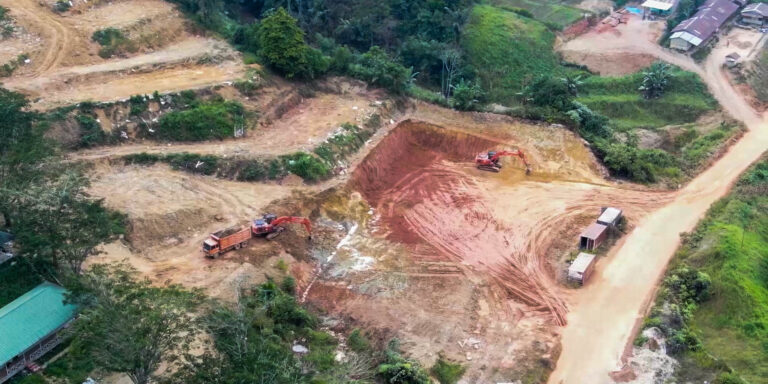
In an area prone to natural disasters, residents claim a new mining project has damaged homes and livelihoods and left them fearing for their safety
Villagers in North Sumatra have accused the Indonesian government of putting their lives at risk by allowing a zinc mining firm to operate in an area prone to earthquakes and flooding.
People in the mountainous Dairi Regency claim construction work carried out by Dairi Prima Mineral (DPM) has damaged their homes and livelihoods. They fear for their safety as the mine, which is expected to be operational in 2025, will sit on the Great Sumatran fault.
“We are worried that because Dairi is a disaster-prone area, will the company be able to guarantee the safety of the villagers,” says villager Saudur Sitorus. “We don’t need a mine. We live from farming, not from mining. Mining will only benefit a handful of people.”
DPM, which is majority owned by Chinese company China Nonferrous Metal Industry’s Foreign Engineering and Construction, obtained a mining concession permit for more than 24,000 hectares (59,305 acres) of land in Silima Pungga-Pungga subdistrict in 1998 and has since drilled in the surrounding hills, and built underground tunnels.
Villagers claim waste from the mine has killed thousands of fish in the nearby river and its construction led to flash floods in 2018 that killed six people and destroyed hundreds of hectares of farmland.
The company denies it was responsible. Syahrial Suandi, an external consultant for the company, said DPM had given residents money to help compensate for the dead fish, adding: “The company does not know the cause of the death of the residents’ goldfish livestock … [the company] provided assistance … as charitable assistance, solely as a form of empathy and concern from the company for the difficulties experienced.”
He says the flooding was due to illegal logging carried out further upstream by another party.
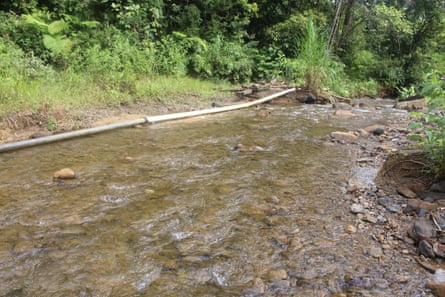
Residents have also complained about the location of a tailings (waste) dam and an explosives warehouse, moved to within metres of people’s homes – a move the government approved in November.
“Without notifying the villagers, suddenly they [DPM] had set up an explosives warehouse in the village and, without my parents knowing, the company built a waste dam behind our house,” says Nia Sihaloho, 36, from Sopokomil village. “How can we live near a dam that at times threatens our safety?”
Sihaloho claims work at the dam has cracked the walls of her parents’ house. She says the family fear their home will collapse on top of them.
In 2019, villagers lodged a complaint about the mine with the World Bank’s International Finance Corporation’s (IFC) ombudsman. At the time, the IFC had given loans to a DPM shareholder. Its investigation, published in July, said a preliminary review of information about the mine “suggests shortcomings in the design of DPM’s tailings dam and assessment of associated risks compared with good international industry practice for the construction of such facilities, particularly considering the topographical, geological, seismic and climatological characteristics of the site.”
However, because the shareholder severed ties with DPM, the ombudsman could not take the complaint further.
Tongam Panggabean, a director of the advocacy group Bakumsu, which is supporting villagers, says: “It is clear they [the government] are willing to sacrifice these communities’ safety to big business.”
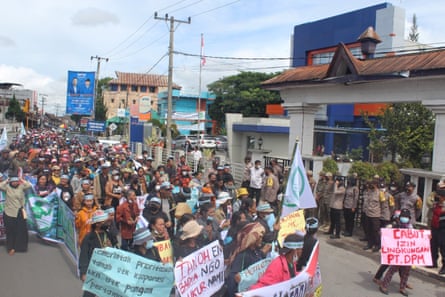
Regina Aritonang, 61, a resident of Bongkaras whose paddy fields were wiped out by the 2018 flood, said: “We used to eat rice from the fields, but since the flash flood we couldn’t manage the fields any more, and now we have to buy rice to eat.”
Suandi says “almost all” of the villagers’ concerns about safety were “based on inaccurate information accompanied by a tendency to disinformation”.
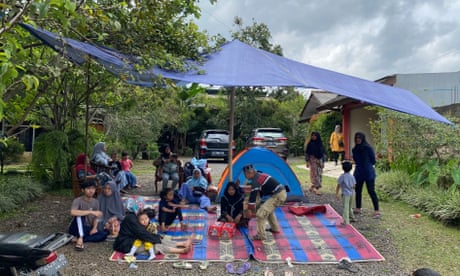
He says the tailings dam was moved to protect the environment and was being planned and built in accordance with government regulations. He said the majority of waste stone material would be returned to the mine pit after being mixed with a special paste, rather than put in the dam. Excess water would be processed before going back into the river, in line with government water-quality standards.
The explosives warehouse, he adds, was moved to improve security at the mine. It will be “a safer distance to mining infrastructure facilities and residential areas”.
Suandi says the company has conducted “a comprehensive seismic hazard analysis and will carry out continuous monitoring”. The dam would be built “with a construction strength capable of accommodating the optimum potential for seismicity that may occur”.
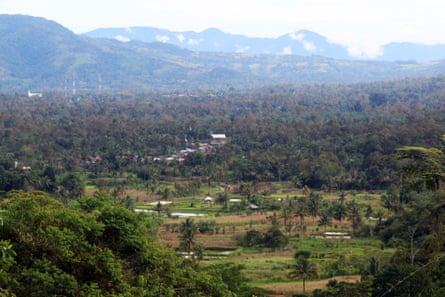
The company also says it has provided education scholarships to the community to study in China and is training young villagers in mining. But these comments have not eased Korlina Simarmata’s worries.
Simarmata, 65, from Bongkaras, who lost millions of rupiah when her fish died, says villagers feel ignored by the government.
“We are very worried now living in this village. We are villagers who don’t know anything about mining, and we were never told about the impact of the mine. We were never informed where the underground tunnel was built, we don’t know, so we are very worried the mine will bring disaster to our village.”
The government did not respond to repeated requests for comment.
… as 2023 begins, and you’re joining us from Indonesia, we have a small favour to ask. A new year means new opportunities, and we’re hoping this year gives rise to some much-needed stability and progress. Whatever happens, the Guardian will be there, providing clarity and fearless, independent reporting from around the world, 24/7.
Times are tough, and we know not everyone is in a position to pay for news. But as we’re reader-funded, we rely on the ongoing generosity of those who can afford it. This vital support means millions can continue to read reliable reporting on the events shaping our world. Will you invest in the Guardian this year?
Unlike many others, we have no billionaire owner, meaning we can fearlessly chase the truth and report it with integrity. 2023 will be no different; we will work with trademark determination and passion to bring you journalism that’s always free from commercial or political interference. No one edits our editor or diverts our attention from what’s most important.
With your support, we’ll continue to keep Guardian journalism open and free for everyone to read. When access to information is made equal, greater numbers of people can understand global events and their impact on people and communities. Together, we can demand better from the powerful and fight for democracy.
Whether you give a little or a lot, your funding is vital in powering our reporting for years to come.If you can, please support the Guardian on a monthly basis, from as little as $2 – it only takes a minute. Your ongoing support is instrumental in helping to secure our future for the years to come. Thank you.
BAKUMSU
Bantuan Hukum dan Advokasi Rakyat Sumatera Utara
Jalan Bunga Kenanga No. 11 D,
Kelurahan Padang Bulan Selayang II
Kecamatan Medan Selayang, Medan 20156
Design by Robby Fibrianto Sirait
